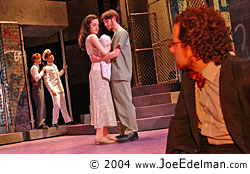
Measure for Measure
Dramaturgy. A little known or understood job that involves a lot of hours in the library, and a very large knowledge of somewhat random facts about the life and staging of a play. I sometimes think of the dramaturg as the hired brain, your head and research skills are the important thing for you to bring to the table. You're there in case the director says, "Hey Charlotte, when were shoelaces invented?" or "Hey Charlotte, what were the most popular venereal diseases of Shakespeare's time?" Because believe it or not, people care about these things. As you stand there with your notepad, ready to block anachronisms from the stage, confident in your ability to understand obscure portions of text, you start to care about these things too, and often your research can lead to imaginative additions to the production. That's plenty to make your close and personal relationship with the research librarian worth it. Now, poring over journal articles may not be the average bear's (or theatre major's) cup of tea, but this up close and personal view of a play's history in production can provide for some illuminating experiences with text and performance. My recent experience as Measure for Measure's dramaturg was no exception.
Shakespeare's Measure for Measure is a notoriously uneven "problem play" whose very complexity and ambiguities has made it popular material in recent years. It was not even performed consistently until the 20th century (an example of a random dramaturgical fact!), and this recent attention is probably a result of the play's theme of corrupt sexual politics, which is, of course, a fascination of our times. And if a play is a "problem" for critics and audiences, imagine the work it poses for the dramaturg! Luckily, Beth Schachter was on the case with this production, and her exciting directorial concept made the play a pleasure to work on with her, the cast, and the crew.
Measure for Measure is a provocative play that reveals a seemingly temperate ruler attempting to measure justice and frailty with some degree of compassion. The Duke of Vienna laments, however, that his city is spoiled and its people too indulgent; to protect his own popular status, he sets in motion a series of deceits that expose the danger of virtue or vice in the extreme. In this production, Shakespeare's scandalous tale is set in a decaying urban America amidst the electronic intrusion of media and politics. The play unravels its own conventions even while telling us the popular story of the ruler who goes into disguise. The Duke goes backstage, as it were, in his own kingdom in order to observe and manipulate the players. "Measure for Measure engages us with the very modern-feeling issue of celebrity—the public persona of a leader," Beth says, "And, because the play swims in the world of politicians and power, it necessarily also encompasses the corruptions that ride, parasite like, on the back of the political."
This Measure for Measure foregrounded a side plot about a distant war in Hungary in order to highlight the Duke's displacement of national concerns through a focus on moral matters. The cast of characters was also expanded to include Dick Cheney and a character known as Halliburton. As money changed hands, pregnant women were dragged off to jail against the backdrop of a pounding rock soundtrack, and a nun was seduced by the Duke's replacement, Angelo, the audience was left to wonder "What's going on?" as the play concluded with a Four Non-Blondes lip synch number of a song by the very same name. The challenge of working on this play was to synthesize Shakespeare's world of 1603 with our current and precarious social and political situation.
The Duke became George W., hookers doubled as nuns, Angelo was featured on the cover of People, and Marianna's love-sick lament became a pop ballad that opened the second act. If you are still asking why, here's Beth again: "The Duke is all about 'spin.' He is a dangerous figure because he is tremendously sincere. It is the combination of arrogance and anxiety and a religious belief in the rightness of his own power that strikes me as sadly of the moment. The Duke could be giving White-House press conferences. As we see today with a fantasy nostalgia for a mythological heterosexual family-that-never-was in this country, Shakespeare's ruler also turns to marriage as a cure-all. Marriage becomes the solution to the pandemonium, and the deeper implications of the society's problems are never addressed."
Back to my role as dramaturg... Working on this production gave me a chance to learn about the history of hygiene in Elizabethan England, sample techno and Beck tracks with Jon Reimer, research the history of Halliburton's money interests in the Iraqi war, and even gasp, re-write some Shakespeare text! (If that makes you nervous, imagine how I felt holding the pen that did the blasphemy!) My role in this production inspired me to re-imagine how Shakespeare could be, educate myself about my own moment in time, and see dedicated and imaginative artists at work on every aspect of the production. In words, I had the ideal experience as an audience member and an artist, even while armed with my folder of research.
